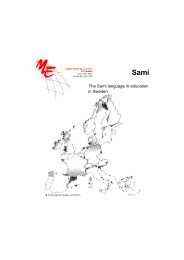Multilingual Early Language Transmission (MELT) - Mercator ...
Multilingual Early Language Transmission (MELT) - Mercator ...
Multilingual Early Language Transmission (MELT) - Mercator ...
You also want an ePaper? Increase the reach of your titles
YUMPU automatically turns print PDFs into web optimized ePapers that Google loves.
those of single parents, attend the provisions 4 or 5 days per week. Depending on the<br />
wages of the parents, the government subsidizes 50-80% of the costs.<br />
Play groups<br />
Playgroup provisions are mainly aimed for children aged 2-4 years. Usually children<br />
attend them 1 to 3 morning(s) per week or approximately 2,5- 3 hours. Playgroups<br />
are financially supported by the municipalities. There are no structural national<br />
financial resources for these provisions. Parents pay a contribution, this depends on<br />
the municipality inquestion.<br />
Childminders<br />
Childminders are speaking Frisian, or Dutch or bilingual. Childminders (a kind of<br />
babysitter, mainly women taking care of the children in their own home while the<br />
parents are at work) take care of children of any age. Childminder’s are mostly<br />
related to the parents, such as a neighbour or a grandparent etc. Care is usually<br />
provided for the full working day.<br />
At the child care centre a number of nursing tasks have to be done (sleeping, eating, giving<br />
bottle etc.). There are always opportunities for free play, sometimes there is a focused<br />
curriculum present and (group) activities are consciously planned. Especially in the play<br />
groups, education is an important part of the everyday program, in order to prepare children<br />
for primary school. All playgroups in Fryslân do use a didactic curriculum. The playgroup<br />
programs contain a mixture of group activities (book reading, talking about it, get<br />
instructions for and execute a creative task) and individual activities (having conversations,<br />
telling stories, playing a game etc.). Day care and pre-school provisions belong to the<br />
Ministry of Education Culture and Science. 28<br />
In 2010, The Education Council of the Netherlands advised to the Ministry that all primary<br />
schools in the Netherlands should offer education and care for all three year olds during five<br />
mornings a week. Also more qualified staff should be trained and educated, in order to<br />
prevent language deficits. The Dutch government emphasizes that, by 2011, all children<br />
need to attend pre-school before primary school and obliges municipalities to establish preschool<br />
provisions, in order to offer children “at risk” additional education. In the four big<br />
cities of the Netherlands huge numbers of immigrants are settled. Often their children don’t<br />
speak Dutch when they start attending primary school at 4 or 5 years. In 2011, the<br />
experiment ‘the group 0’ has started; a class for children aged two and three years with a<br />
Dutch language deficiency. 29 In Fryslân, this issue does not apply.<br />
Child-staff ratios and maximum group size<br />
In day care nurseries the size of the group depends on the area where the nursery is located,<br />
usually a group consists of 12-14 children. The child - practitioner ratio is approximately 5:1.<br />
Usually a student is added to the staff of the group.<br />
In playgroup the group size consist of up to 15 children. They are usually lead by one paid<br />
pre-school teacher and one volunteer or student.<br />
28 OC&W, Ministry of Education Culture and Science urged the day care centres and the playgroup provisions to attune and to integrate<br />
pre-school provisions in primary education, creating centres for children from birth to age 12. Deunk, M. (2009) Discourse Practices in<br />
Preschool. Young Childrens’s Participation in Every Classroom Activities. Zutphen: Wörhrman Print Services.<br />
29 The website of the National government ‘Rijksoverheid’ www.rijksoverheid.nl - toddlers and language delays-<br />
http://www.rijksoverheid.nl/onderwerpen/leerachterstand/taalachterstand-bij-peuters [Accessed June 2011].<br />
23



